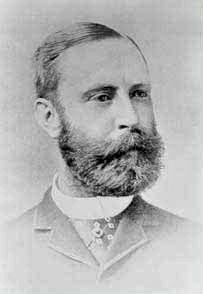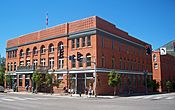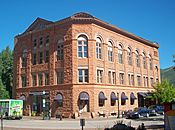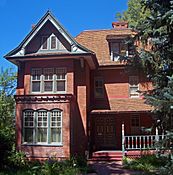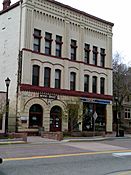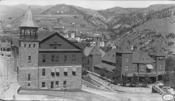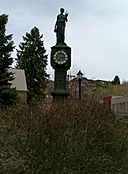Jerome B. Wheeler facts for kids
Jerome B. Wheeler was a successful businessman who owned mines, a hotel, and other companies in Colorado. He was also a partner and president at Macy's, a famous department store in New York City.
Contents
Early Life: A Young Start
Jerome Byron Wheeler was born on September 3, 1841, in Troy, New York. His family moved to Waterford, New York when he was young. He went to public school until he was 15 years old. In 1856, he started working in an office. From 1857 to 1861, he learned about mechanical trades, which might have included engineering or machine work.
Civil War: A Brave Soldier
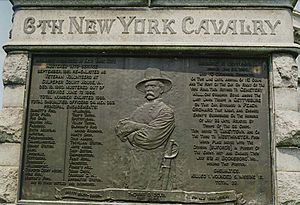
On his 20th birthday, at the start of the American Civil War, Wheeler joined the army as a private. He was part of the 6th Regiment New York Volunteer Cavalry. He trained in Staten Island, New York and was stationed in Washington, D.C. before getting his horse in Virginia.
His regiment fought in the Shenandoah Valley and during General George B. McClellan's Peninsular campaign. Wheeler moved up the ranks quickly, becoming a second lieutenant and then a colonel. He once brought supplies to starving Union Army soldiers who were stuck behind enemy lines. This was a very dangerous mission. Because he went against orders, his rank of colonel was reportedly taken away. He left the army in September 1865.
New York: Business Success
After the war, Wheeler returned to Troy, New York, and worked as a bookkeeper. Around May 1866, he moved to New York City. He took an office job at a company that traded grain. In 1869, he started working at Holt and Company, a large flour and grain business, as a bookkeeper. After 10 years, he became a full partner in the company.
In 1870, Wheeler married Harriet Macy Valentine. She was related to Rowland Hussey Macy, who founded Macy's, a very large department store in New York City. In 1879, after Rowland Hussey Macy passed away, Charles Webster asked Wheeler to become a 45% partner in buying the department store. Wheeler remained a partner until 1888. At that time, there was a lot of competition from other stores with strong advertising.
Wheeler passed away in Colorado in December 1918. He is buried at Woodlawn Cemetery, Bronx in New York City.
Colorado: Mountain Investments
In 1883, Wheeler visited Colorado and "fell in love with the Colorado mountains." He decided to invest his money there.
Aspen: Mines and Buildings
Wheeler invested in successful mines in Aspen, Colorado and Leadville, Colorado. In Aspen, he bought mines and built a special tramway. This tramway helped bring ore (rock with valuable minerals) down the mountain. The ore was then processed at a smelter he built at the mountain's base. He was also president of the Croseus Gold Mining and Milling Company.
Wheeler spent almost a million dollars each to build the famous Hotel Jerome and the Wheeler Opera House. He also invested in the Colorado Midland Railway and became a director in 1885. In 1888, the Wheeler–Stallard House was built for him, but he never actually lived there. Wheeler also built a mountain tramway and a bank in Aspen.
Leadville: Mining Company
In Leadville, Colorado, Wheeler was the president of the Rock Hill Consolidated Gold and Silver Mining Company.
Manitou Springs: Health and Water
Wheeler moved to Manitou Springs, Colorado, hoping to improve his wife's health. She had a serious case of bronchitis. In 1888, Wheeler built the Wheeler Bank, which was the town's first bank. He also started the Manitou Mineral Water Company. This company bottled and shipped mineral water all over the country, even to the Waldorf Astoria Hotel in New York.
In 1893, Wheeler built the Windemere estate in Manitou Springs. This large property included a greenhouse, a coach house, billiard rooms, and a bowling alley. He also invested in the Manitou and Pike's Peak Railway. This was a special cog railway that carried passengers to the very top of Pikes Peak.
-
Wheeler Bank building
Financial Fortune: Ups and Downs
Wheeler's mines in Leadville, Colorado and Aspen earned about $5 million in the 1880s. However, he lost much of his money during the Panic of 1893, which was a big economic downturn.
 | Selma Burke |
 | Pauline Powell Burns |
 | Frederick J. Brown |
 | Robert Blackburn |


